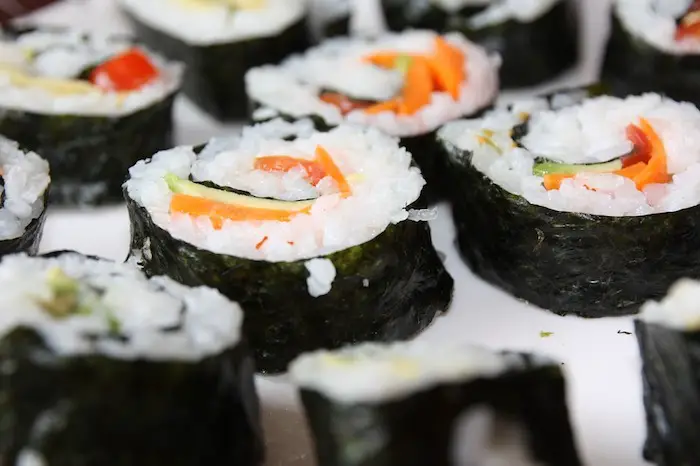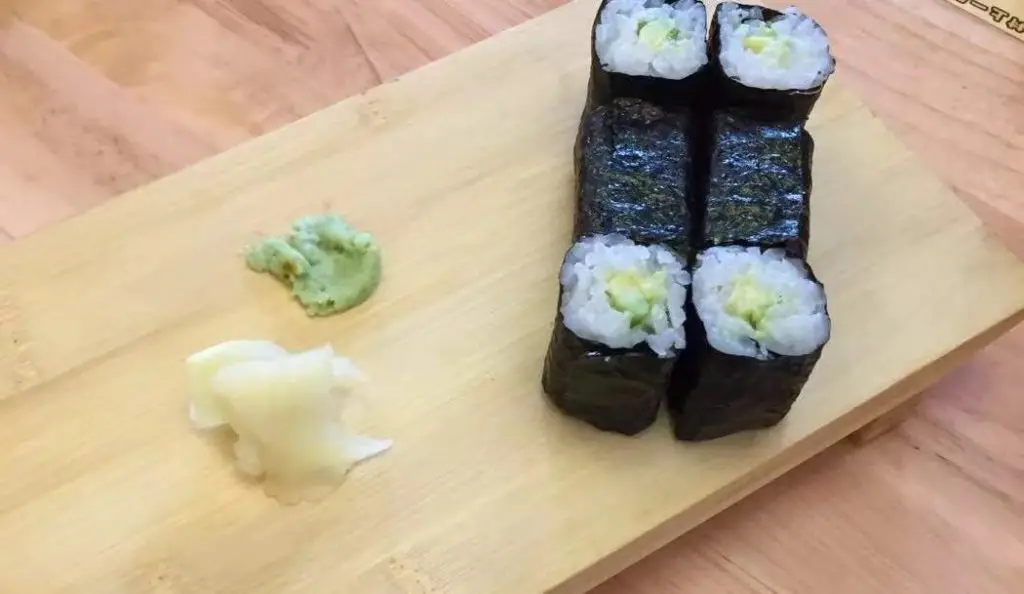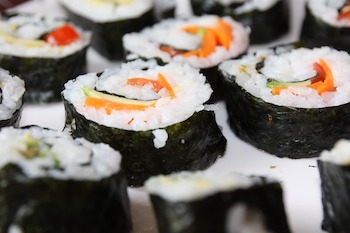We are reader supported. When you purchase through links on our site, we may earn an affiliate commission. Also, as an Amazon affiliate, we earn from qualifying purchases.

Sushi is such a delightful cuisine that it’s hard to imagine anyone not partaking. However, food allergies and medical conditions aside, there are some people who don’t eat sushi. Whether it’s a matter of taste preference, cultural differences, availability, or lifestyle choices, some people don’t enjoy sushi.
But do vegans eat sushi? Yes! Vegans can and do eat sushi. The rice used in these dishes is actually vegan itself. There is a wide variety of sushi styles and flavors to suit nearly any dietary requirements. Sushi types often enjoyed by vegans include avocado rolls, cucumber rolls, and eggplant sushi.
That’s a relief for many vegans. Yet, as you may have guessed, there is a lot more to this topic than just a quick answer and a few suggestions. Below, I dive into the deep end of vegan sushi to answer all of your burning questions.
Contents
How can sushi be vegan?
A common myth is that all sushi is made with raw fish. While I am not planning on going too far into sushi history, I can tell you this. Sushi originated as a fast and nutritious food for workers on the Edo River—now known as the Tokyo River. It was either raw or pickled fish served over rice, much like we imagine it today.
But food evolves. Over time, sushi was demanded by all types of people all over the world. As such, the recipes had to change to meet the ever-increasing demand for variety. One day, vegetarian sushi was born. Shortly after that, vegan sushi became popular, too.
But what exactly is vegan sushi?
The vegan lifestyle and dietary restrictions dictate that no animal flesh and no animal products be consumed. This is a pretty open statement leaving some room for interpretation. Every individual will have their own ideas and their own plans, but it’s all basically the same.
You don’t eat meat, fish, eggs, butter, milk, or anything that came from an animal.
Since fish and other seafood are living creatures, that means no sushi. Right? Wrong! Vegan sushi does exist, and it’s just as tasty as the original kind.
As long as all of the ingredients used to make your sushi meal are animal-free, it counts as vegan.
What are some vegan sushi options?
Which vegan sushi options are available locally for you will depend on the restaurants you’re visiting. You’ll want to ask the proprietor for the vegan menu up front. Make sure their definition of vegan matches yours, too. Make it clear what you will and will not eat. Many places will custom create a dish for you if you’re polite and you ask clearly for what you want.

Some vegan sushi options include:
- Shiitake mushroom sushi. These savory mushrooms are strong-tasting and have a pleasant texture. They have a firm but yielding bite that makes these rolls a real joy to eat. The mushrooms are usually lightly salted or dipped in soy sauce, then briefly flame-touched to bring out more of their amazing aroma and flavor.
- Nasu, or eggplant sushi. In
J - apan, eggplants are available year-round, so this is a popular choice of vegan sushi lovers. For a soft texture, the eggplant is grilled. If you prefer a chewy texture, you can ask for pickled
nasu instead. - Avocado rolls (see recipe) or nigiri. Avocado is popular in many cuisines, but it’s especially tasty in sushi. This buttery morsel is both decadent and healthy. Whether in a roll or nigiri style—avocado on top of rice and held together with a nori strip—it’s a great vegan choice.
- Kappa maki, or cucumber roll. This is one of the safest choices on a vegan sushi menu because it’s literally just cucumber, rice, and a seaweed wrap. I’ve never seen this made with anything other than those three ingredients, so it’s tough to mess it up. It also happens to be refreshing and delicious.
How do I make sure my sushi is vegan?
It would be nice to be certain your food is actually vegan when you order out. But, unfortunately, since the definition of vegan is often confused with vegetarian, a well-meaning chef may end up serving you non-vegan options.
To be sure your sushi is actually vegan, you’ll have to do a little work. Sometimes it’s as easy as calling a sushi bar in advance and asking for the menu. If you trust their word, you can go in and see for yourself.
However, I strongly encourage you to ask for specific ingredient lists, too. Since all sushi joints have their own recipes, you never know when someone will sneak something in your sushi that you find offensive.
Ask for substitutions!
If you weren’t always vegan and you have fond memories of a specific kind of sushi, you may still be able to enjoy it. Many sushi bars will allow special orders! They can substitute toppings and fillings, for example.
You never know until you ask, so don’t be shy. Some sushi chefs even welcome the challenge to recreate a non-vegan taste using completely vegan ingredients!
What should I avoid at a sushi restaurant if I want vegan sushi?
I think this question is just as important as asking what kind of vegan sushi you should look for. Knowing what to avoid can help you stick to your vegan diet plan.
Stay away from anything with bonito. It may come as a bonito sauce or bonito flakes. No matter how it is served, it’s made from fish. Also stay away from tempura. This crispy and tempting coating is usually made with some kind of animal product. It may be milk or eggs or even vegan ingredients fried in animal oils. Unless you know for certain that every ingredient and every step is vegan, it’s best not to take a chance.
Is tofu a safe vegan choice?
Generally speaking, yes, tofu is a safe vegan option. It is made from soy bean milk which has been processed. Some vegans don’t like the taste of tofu, and some are even turned off by it because it goes through a similar process as cow’s milk. However, tofu itself is supposed to be vegan.
There is a slight chance that tofu has been cross-contaminated with animal products. You need to be careful where your tofu comes from. That means you need to ask where your sushi joint’s tofu came from, too.
Related Article: 8 Exciting Recipes For Vegetarian Sushi
Seaweed, or nori, seems to be in most sushi, but is it vegan?
The green wrapper you see on a lot of sushi, or tucked deep inside, is called nori. It is dried seaweed that is nutritious and packs a powerful taste. Seaweed is a plant, but is it truly vegan?
While a lot of vegans consider nori to be a safe choice, there are some who don’t agree. The problem isn’t with the nori itself. Unfortunately, some nori is grown using mollusk shells. And, as you probably know, mollusks are living creatures.
It’s not likely that any animal products have made it into your nori. But that isn’t where the issue lies. The real problem with nori grown using mollusk shells is the animal exploitation aspect. Depending on how strictly vegan you are, that might be enough for you to say no to nori.
Is nori vegan? Maybe. It really boils down to your own personal definition of vegan and what choices you want to make for your own dietary or moral reasons.
It’s not all about sushi!
If your friends have invited you out to a sushi restaurant that you’re uncertain of their vegan sushi options, you can still enjoy some of their other options. There may be soups, salads, appetizers, and sweet treats available that fall under your specific dietary guidelines.
After all, a good sushi bar experience doesn’t have to include just the traditional sushi types.
Related Questions
Is a California roll vegan?
A traditional California roil is not vegan. It’s usually made with imitation crab. Imitation crab is made from ground white fish. Obviously, fish isn’t vegan, so traditional California rolls are not vegan. However, some sushi places will use non-meat substitutes in their California rolls. You just need to ask.
Do vegans eat fish?
No, vegans do not eat fish. It is a common misconception that vegans and vegetarians are the same thing. Some vegetarians will eat fish and animal products. Vegans, however, do not eat fish, meat, or any products made with animals products. That includes milks, eggs, and cheese.
Is kanpyo vegan?
Kanpyo is dried shavings of the calabash gourd. As long as the gourd was grown without animal products and processed without animal products, kanpyo is considered vegan. Be sure what you’re ordering is genuine kanpyo, however. Dried foods can be hard to identify.
Is sushi rice vegan?
Yes, most sushi rice is vegan. Sushi rice is usually prepared with a specific kind of vinegar. Unless the rice was cooked with or

